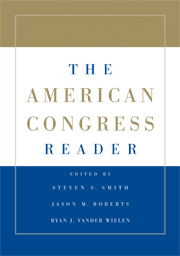Book contents
- Frontmatter
- Contents
- THE AMERICAN CONGRESS READER
- PART I THE AMERICAN CONGRESS: MODERN TRENDS
- PART II REPRESENTATION AND LAWMAKING IN CONGRESS: THE CONSTITUTIONAL AND HISTORICAL CONTEXT
- PART III CONGRESSIONAL ELECTIONS AND POLICY ALIGNMENTS
- PART IV MEMBERS, GOALS, RESOURCES, AND STRATEGIES
- PART V PARTIES AND LEADERS
- PART VI THE STANDING COMMITTEES
- PART VII THE RULES OF THE LEGISLATIVE GAME
- PART VIII THE FLOOR AND VOTING
- PART IX CONGRESS AND THE PRESIDENT
- 28 Presidential Veto Messages
- 29 Presidential Signing Statement
- 30 Veto Bargaining
- 31 The Dynamics of Legislative Gridlock, 1947–1996
- 32 The Politics of Shared Power
- 33 Conscience of a Conservative
- PART X CONGRESS AND THE COURTS
- PART XI CONGRESS, LOBBYISTS, AND INTEREST GROUPS
- PART XII CONGRESS AND BUDGET POLITICS
- PART XIII FURTHER READINGS ON CONGRESSIONAL POLITICS
- References
32 - The Politics of Shared Power
Congress and the Executive – Excerpt
Published online by Cambridge University Press: 05 June 2012
- Frontmatter
- Contents
- THE AMERICAN CONGRESS READER
- PART I THE AMERICAN CONGRESS: MODERN TRENDS
- PART II REPRESENTATION AND LAWMAKING IN CONGRESS: THE CONSTITUTIONAL AND HISTORICAL CONTEXT
- PART III CONGRESSIONAL ELECTIONS AND POLICY ALIGNMENTS
- PART IV MEMBERS, GOALS, RESOURCES, AND STRATEGIES
- PART V PARTIES AND LEADERS
- PART VI THE STANDING COMMITTEES
- PART VII THE RULES OF THE LEGISLATIVE GAME
- PART VIII THE FLOOR AND VOTING
- PART IX CONGRESS AND THE PRESIDENT
- 28 Presidential Veto Messages
- 29 Presidential Signing Statement
- 30 Veto Bargaining
- 31 The Dynamics of Legislative Gridlock, 1947–1996
- 32 The Politics of Shared Power
- 33 Conscience of a Conservative
- PART X CONGRESS AND THE COURTS
- PART XI CONGRESS, LOBBYISTS, AND INTEREST GROUPS
- PART XII CONGRESS AND BUDGET POLITICS
- PART XIII FURTHER READINGS ON CONGRESSIONAL POLITICS
- References
Summary
Fisher examines executive–legislative relations and contends that the modern manifestastion of this relationship increasingly deviates from the theoretical notion of a strict separation of powers. Rather, Congress and the president have taken on numerous roles in the other's traditional domain. In this excerpt, Fisher explores the ways in which the president is engaged in the legislative process and members of Congress are engaged in the administration of programs.
PRESIDENT AS LEGISLATOR
To a literalist, the Constitution limits the president to two forms of legislative activity: (1) the right to recommend to Congress such measures “as he shall judge necessary and expedient” and (2) the power to veto a bill. To this list can be added the president's power (shared with the Senate) to make treaties, which the Constitution defines as part of “the supreme Law of the Land.” A fourth source of influence, which has been exercised on rare occasions in the past, permits him to convene both houses or either of them. In case they disagree on the time of adjournment, the president can adjourn them “to such Time as he shall think proper.”
The Supreme Court has held that in the “framework of our Constitution the President's power to see that the laws are faithfully executed refutes the idea that he is to be a lawmaker.” According to this view the Constitution limits the president's functions in the lawmaking process to “the recommending of laws he thinks wise and the vetoing of laws he thinks bad.”
- Type
- Chapter
- Information
- The American Congress Reader , pp. 354 - 373Publisher: Cambridge University PressPrint publication year: 2008

